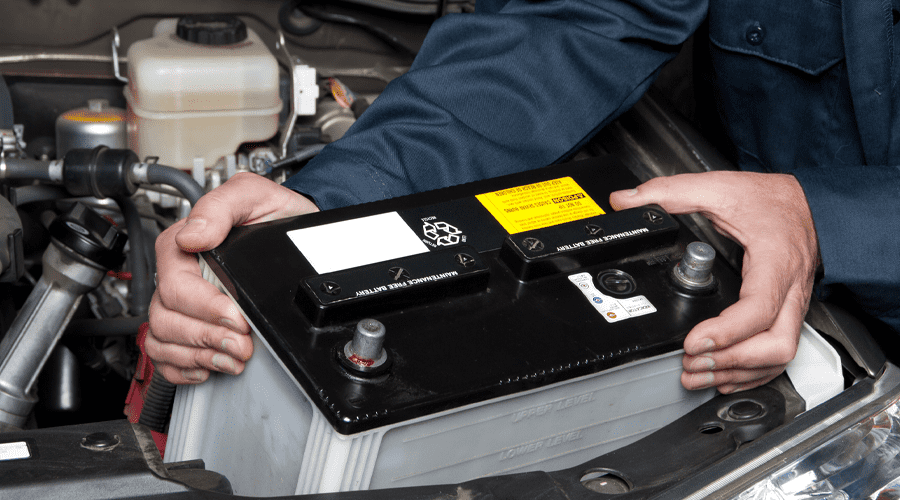
7 Signs When It’s Time For A New Car Battery
Your battery is quite literally the lifeblood of your vehicle. Not only is a battery integral for starting your engine, it also powers all of the electrical components in your ride. Without a fully-functioning battery, you’ll be heading nowhere with nothing playing on the radio.
How does a car battery work?
While starting a car is as easy as turning a key or pressing a button, your battery is doing all the heavy lifting. Starting the ignition sends a signal to the battery that kicks off a chemical reaction inside the little black box. The reaction turns into electrical energy that gets the starter motor running and the engine cranking. If your battery is dead, your lights might flicker but your engine won’t have the energy to turn over.
In this post, we’ll cover all you need to know about your vehicle’s battery as well as the seven signs that it’s time for a new one.
How long does a new car battery last?
Once you replace your vehicle’s battery, its lifespan depends on how long it can hold its charge as well as how long it’s capable of being recharged. Once it can’t be recharged, it’s dead. If you’re always driving in ideal conditions — no extreme temperatures and no excessive humidity — it’s believed that a new battery can last as long as six years.
How often does a car need a new battery?
Though the exact lifespan of a battery is dependent on the vehicle and its condition, it’s safe to say most vehicles need a new battery every four years on average. For most Manitobans who are driving in winter conditions for half the year, that life span may be slightly shorter. At the three year mark, start paying attention to how your vehicle is running. It’s important to catch the problem before it affects the health of your vehicle further.
With that being said, the batteries in new vehicles often don’t provide signs that they’re about to fail. This is why it’s a good idea to remember the three to four year rule. When you go to your car maintenance appointments get your mechanic to check your car battery next time your vehicle is in. And remember, all vehicle batteries will need replacing — unfortunately, there’s no way to avoid having to replace your battery.
7 signs your car battery is dying
There’s a few key warning signs that are good indications your battery’s life is coming to an end. The first factor is your ‘check engine’ light coming on. This usually means your battery is slowing down though it could also have to do with your vehicle’s alternator. Pay attention to the way your vehicle reacts when it starts as well.It’s a good idea to keep an eye on the health of your battery so you don’t get stranded in the middle of nowhere with a car that won’t start. Here are seven signs that your car battery is dying:
1. A slow starting engine
Over time, the components inside your battery will wear out and become less effective. When this happens it takes the battery longer to create a charge for the starter and you’ll have to wait a few extra seconds for the engine to turn over. A slow start is usually the last gasp before a battery kicks the bucket.
2. Dim lights and electrical issues
The battery powers all of the electronics in your vehicle, from your lights to your radio to your dashboard computer. If the battery is losing its charge it will have a harder time running these things at full power. The more things you plug into your car while driving — like your phone charger — the faster your battery will die.
3. The check engine light is on
In most vehicles, the check engine light can mean just about anything and it may come on when your battery is running out of juice. Check your manual and get your battery tested by a mechanic to see if it’s working at full capacity. If not, you should get it replaced.
4. Bad smell
Damage to the battery or an internal short can cause the battery to leak gas. If you smell rotten eggs when you open the hood, a leaking battery may be the culprit. Take it in to get checked out. The mechanic will let you know if the battery needs replacing and what the next steps will be..
5. Corroded connectors
Notice a white, ashy substance on the metal parts of your battery? You’ve got a corrosion issue. Corroded terminals — the positive and negative metal connections on the top of the battery — can lead to voltage issues and trouble starting your vehicle.
6. A misshapen battery case
The wild climate of the prairies can do a number on the lifespan of your battery. Exposure to extreme heat and cold can actually cause a battery case to swell and crack. If your battery is anything but rectangular, chances are it isn’t working properly.
7. Old battery
It goes without saying but after a while it’s easy to forget when you last had your car battery checked. When was the last time your battery was replaced? In ideal conditions, car batteries typically last 3-5 years. Climate, electronic demands and driving habits all play a role in the lifespan of your battery. It’s a good idea to air on the side of caution and get your battery performance tested regularly once it gets close to the 3-year mark.
 What causes a car battery to die quickly?
What causes a car battery to die quickly?
Your battery stays charged by reusing the energy created from driving. If your car sits in the driveway for long periods of time you run the risk of killing your battery. Similarly, making a lot of short trips that don’t allow the battery to recharge can strain the system. And last but not least, don’t forget to turn your lights off — we all know how that ends!
How much does it cost to replace a car battery?
The cost of your vehicle’s battery will vary based on the year of your vehicle, model and who you’re purchasing the battery from. On average batteries for newer vehicles cost anywhere from $80 to $150. Premium batteries for luxury vehicles can run as high as $200. Keep in mind, that cost doesn’t include installation or your mechanic’s labour. A reputable mechanic shop will probably charge an average of $70 for installation.
Does a new car battery need charging?
The simple answer to this question is no. When you purchase a new battery for your vehicle, it will come fully charged. In the past, batteries used to come dry and the distributors would have to fill them with acid. However, this isn’t the case anymore.
To ensure your new battery is in fact fully charged, make sure it meets the following checklist:
- You purchased it fully-sealed
- It’s a 14 volt battery
- You purchased it from a trusted manufacturer or business.
Car Battery Maintenance
Just like your car, your battery also needs to be maintained. Here’s a few tips on how to maintain your car battery:
Garage
If you can keep your vehicle in a safe garage space, you might want to consider leaving the security system turned off. Leaving it on will only drain the battery quickly. If you don’t have a choice and it has to leave the security system on, drive your vehicle regularly for 30 minutes once a week, this will help keep the battery working properly.
Weekly car drive
As mentioned above, driving your car for 30 minutes weekly is beneficial because it will keep the car battery charged. If you only use your car for short drives it might not be enough to get the battery recharged, because it won’t have time.
Check the fluids & Car Battery Test
When you bring your vehicle for maintenance, ask the mechanic to check all the fluids and do a car battery test. If it needs changing it can be done while in maintenance so you don’t have to worry about your car dying on you.
Block heater
If you don’t have a block heater, consider installing one. In Manitoba we have a severe winter and reducing the stress on the battery makes it easier to turn the engine on. It’s a low cost move that will improve your battery life.
Bad Credit Car Loans In Winnipeg Made Easy
At Birchwood Credit, we specialize in helping people with less than perfect credit purchase a vehicle. We understand the challenges that come with being in a difficult financial situation and are here to help you through the process. Click here if you are looking for more information on bad credit car loans in Winnipeg.
At Birchwood Credit Solutions, our service is free, fully secure and you’re under no obligation to purchase. We have the experience and resources to help with all types of credit situations. Learn more about our process and securing financing from a trusted brand name.
Related blog posts:


 What causes a car battery to die quickly?
What causes a car battery to die quickly?
